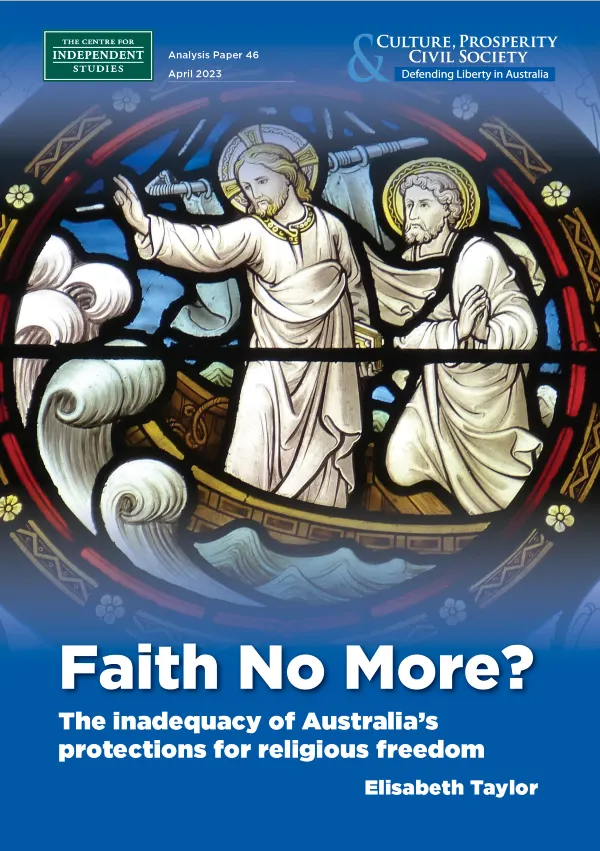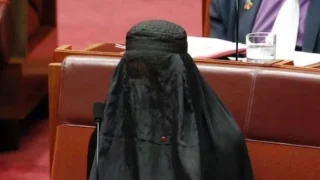
Freedom of thought, conscience and religion is inextricably connected to the freedoms of expression, assembly, association, and a range of other rights that are foundational to modern pluralist democratic society. To be effective the freedom has to be guaranteed against incursion from official and private sources, and secured without discrimination. This paper explores some of the compelling reasons for guaranteeing freedom of thought, conscience and religion, alongside the companion freedoms that support it. It assesses Australia’s track record in meeting its obligations to guarantee that freedom and concludes that Australia trails behind much of the rest of the world. The absence of any real legislative protection for religious freedom, and certainly none to the UN International Convention on Civil and Political Rights standard, leaves this space open to perpetual contest by competing rights. Current trends see the erosion of this freedom, with a proliferation of laws that impinge upon it, as governments and public guardians of human rights give way to popular cultural hostility against religion.
Executive Summary: The inadequacy of Australia’s protections for religious freedom
As one of the necessary preconditions for democracy to prosper and benefit all society, freedom of thought, conscience and religion can hardly be overstated in importance. It enables citizens to be directed by their conscience and beliefs, to give expression to what matters most to them, and to associate with those of like mind. As the European Court has observed in terms that are familiar but should not be forgotten, religious freedom is “one of the most vital elements that go to make up the identity of believers and their conception of life, but it is also a precious asset for atheists, agnostics, sceptics and the unconcerned.”[1]
Democracy does not itself guarantee the freedoms upon which it depends, but the ideals of democracy help define those freedoms, especially by confining the circumstances in which the freedoms may be restricted. The freedom is profoundly important to those with minority, or unpopular, beliefs. It must be secured in law, in terms that ensure it cannot be abridged except on defined grounds and subject to strict criteria of necessity and proportionality.
Although Australia has ratified the UN’s International Convention on Civil and Political Rights (ICCPR) and must implement laws to give effect to article 18 rights to freedom of thought, conscience and religion; it has not done so. A patchwork of laws at federal, state and territory level offers only incomplete protection, and this is increasingly susceptible to encroachment by legislation restricting the freedom without proper regard for the terms of article 18.
The absence in Australia of the positive protection required by article 18 means that those of faith are especially disadvantaged when ideological opponents are able to assert a range of powerful, legislatively-based rights against them. The principle that the law should provide equal protection to all is undermined by laws which embed ideals which are antithetical to traditional religious beliefs.
Instead of being positively enshrined in law, which declares its societal value, freedom of religion is the subject of continual political contest. When advocating the correction of legislative imbalances, those who hold religious beliefs often are derided for seeking the removal of the rights of others.
Recent parliamentary inquiries have recognised that legal protections for freedom of religion in Australia are inadequate. The Ruddock Review and the Religious Discrimination Bill presented in the last days of the Morrison government fall well short of the recommendations made by a separate inquiry, chaired by Kevin Andrews, which recommended implementing all of the provisions listed under article 18 of the ICCPR. Even attempts to achieve lower standards of protection have been politically frustrated.
Meanwhile, the Australian Law Reform Commission has proposed amendments to the discrimination exemptions that currently allow religious schools to operate in accordance with their ethos. The proposed changes would have the effect of narrowing these rights to the point of extinction. Proposals such as this, combined with interpretations of article 18 by the Australian Human Rights Commission, bear witness to the reality that until freedom of religion is given substantive, positive legal effect in Australian law, with the protective scope required by the ICCPR, the freedom can continue to be eroded.
Introduction
Freedom of thought, conscience and religion is “far-reaching and profound”.[2] It is inextricably connected to the freedoms of expression, assembly, association, and a range of other rights that are foundational to modern pluralist democratic society. As a ‘freedom’, it only has substance if individuals know they are at liberty to express, exchange and explore what they and others believe, without cost or coercion, and can make life choices directed by their beliefs.
To be effective the freedom has to be guaranteed against incursion from official and private sources, and secured without discrimination. Only then are the conditions established in society for human flourishing, and for the preservation of a model of democracy which is inclusive. Freedom in this sense not only serves the well-being of the individual, but is symptomatic of a healthy democratic society, able to protect itself against destructive influences.
This paper explores some of the compelling reasons for guaranteeing freedom of thought, conscience and religion, alongside the companion freedoms that support it, within a broad scheme of rights for everyone. It assesses Australia’s track record in meeting its obligations to guarantee that freedom and concludes that Australia trails behind much of the rest of the world. A freedom which is uncontroversial in other countries, is subject to perpetual political contest in Australia. It should simply be a matter of meeting international obligations for reasons which tower above parochial, partisan or cultural pressures.
This paper examines what freedom of religion is, why it is particularly important and argues that the ICCPR is the correct standard against which Australia’s performance should be measured. A survey of the protections that currently exist for this freedom in Australia points to significant deficiencies. The detrimental consequences of this are now affecting the lives of all Australians, whether they profess a religious faith or not.
What is freedom of religion and why is it important?
The Universal Declaration of Human Rights proclaimed by the United Nations General Assembly in 1948 established for the first time a common international standard for recognising fundamental human rights and freedoms. It embodies many international customary law norms that are distinctive for achieving a particular status through reflecting uniform and consistent practice across jurisdictions, with the character of legal obligation. The Preamble to the Declaration lists several reasons why these rights demand recognition and protection. Among them is that recent history had demonstrated that “disregard and contempt for human rights” resulted “in barbarous acts which have outraged the conscience of mankind”. “If man is not to be compelled to have recourse, as a last resort, to rebellion against tyranny and oppression … human rights should be protected by the rule of law”. It was necessary to articulate universal human rights in detail to ensure “a common understanding of these rights and freedoms”.
With similar purpose, but with binding rather than merely declaratory effect, the International Covenant on Civil and Political Rights (ICCPR) codified in 1966 a system of integrated and interconnected rights. Article 18 guarantees “freedom of thought, conscience and religion” in similar terms to the Universal Declaration but with greater specificity. It protects free choice in religion or belief, and unusually accords it absolute protection. It also gives absolute protection to the “respect” which states must show “for the liberty of parents … to ensure the religious and moral education of their children in conformity with their own convictions”.
Article 18 also formalised the individual’s right to express their religion or belief in a variety of ways, on their own or in community with others. The security which the individual derives from the freedom to “manifest one’s religion or beliefs” is that it may only be restricted within defined parameters: any restriction on the right must be prescribed by law and necessary for particular purposes, “to protect public safety, order, health, or morals or the fundamental rights and freedoms of others”.[3] The ICCPR holds that freedom of religion is so fundamental to the maintenance of a democratic society that it may not be derogated from, even in times of public emergency. Under article 2 of the ICCPR Australia is required to take all necessary steps to enact laws and other measures to give effect to article 18.
Although Australia is treaty-bound to implement all these elements of religious freedom it has not done so. Australia’s strictly dualist legal system means that treaties ratified by Australia (like the ICCPR) do not have domestic legal effect without implementing legislation. It is no exaggeration to say that until freedom of religion is given legal effect in Australian law in some way, with the protective scope required by the ICCPR, the freedom as such does not exist in Australia.[4]
The freedoms of expression, association and assembly are in the same parlous state, lacking the standards of protection required by the ICCPR. Yet taken together they epitomise the concept of individual freedom. The word ‘freedom’ in the ICCPR is reserved almost entirely for the freedoms of belief, expression, assembly and association, where it is mentioned 12 times. They are a prominent set of rights which have the dubious distinction of being among the few ICCPR rights for which Australia has failed to implement proper protections.
These freedoms not only serve the individual, but society as a whole. Together with the democratic rights (the rights in article 25 to vote, to be elected and take part in public affairs), they are the very means by which those in power, and power itself, are kept in check.
The importance of pluralism
From an historical perspective, modern democracies are anomalous in contending that social harmony is best secured by accommodating pluralism, rather than by striving for uniformity of belief. Given the natural human propensity for viewpoint diversity, uniformity of belief must ultimately be coerced in one degree or another. The evidence of history shows that efforts to coerce uniformity, such as the medieval inquisition or the cultural revolution in China under Mao, are profoundly destructive and ultimately futile. As the American jurist, Justice Robert Jackson, observed in 1943:
“Those who begin coercive elimination of dissent soon find themselves exterminating dissenters. Compulsory unification of opinion achieves only the unanimity of the graveyard.”[5]
With similar assumptions and conclusions in mind the European Court has explained that:
“freedom of thought, conscience and religion is one of the foundations of a ‘democratic society’ … It is, in its religious dimension, one of the most vital elements that go to make up the identity of believers and their conception of life, but it is also a precious asset for atheists, agnostics, sceptics and the unconcerned. The pluralism indissociable from a democratic society, which has been dearly won over the centuries, depends on it.”[6]
In itself, democracy is no guarantee of pluralism. Drawing on his own family experiences of the French Revolution, 19th-century political commentator Alexis de Tocqueville warned America of the potential, even in a democracy, for an omnipotent majority to assume the character of a tyrant by excluding unpopular minorities and marginal individuals. Strong laws to protect the freedoms that are necessary for democracy to function provide an important bulwark against the tyranny of the majority. Professor Patrick Parkinson observes that:
“[f]reedom of religion is likely to be under threat, even in a society which has long respected it, if three conditions are satisfied. First, protection for it in the law is weak. Secondly, belief in it as a cultural value has been eroded. Thirdly, there are those with competing claims or ideologies that would wish to encroach on that freedom.”[7]
All the conditions identified by Parkinson as threatening to freedom of religion are clearly present in Australia. Positive legal protection for freedom of thought, conscience and religion is particularly important because, by its very nature, the exercise of this right is bound to cause contention. Paul M. Taylor notes that hostility towards religion and its followers provides the very rationale for protecting religious freedom:
“It is in the nature of most belief systems that they have a minority following and many are disfavoured … Religion increasingly presents issues which are politically charged. Enmity towards a particular religion or even religion in general, cannot itself justify restriction of Article 18 rights no matter how much popular support it may have; indeed the protection of Article 18 is there precisely to protect against harmful consequences of any animus where it exists, whether from State or private sources.”[8]
If further justification were needed for this and other fundamental human rights it is that they are recognised, not conferred. They subsist by virtue of the inherent dignity of the human person; they are not granted either by the State or by popular favour.
What protections exist for religious freedom in Australia?
Measured against the standard of the ICCPR, “to take all necessary steps to enact laws and other measures as may be necessary” to give effect to article 18, Australia’s protection for freedom of religion is defective. Such support as can be found for it in Australian law is confined to:
- Certain aspects of the Common law
- The implied freedom of political communication
- Section 116 of the Commonwealth Constitution
- Human rights charters in the Australian Capital Territory, Victoria and Queensland
- Anti-discrimination legislation at Commonwealth and state/territory levels (protecting against discrimination in specific areas on prohibited grounds)
- Legislative scrutiny
- Periodic reviews of international law compliance.
Common law
The common law offers some inadequate ‘protection’ for freedom of religion in two ways. Firstly, in the principle that “everybody is free to do anything, subject only to the provisions of the law”.[9] This merely means that exercising religious freedom is not unlawful, unless of course it is made unlawful. Secondly, there is a common law rule of statutory construction that “courts do not impute to the legislature an intention to abrogate or curtail fundamental rights or freedoms unless such an intention is clearly manifested by unmistakable and unambiguous language”.[10] Nothing prevents the legislature curtailing freedoms except in the remotely confined circumstances in which section 116 of the Commonwealth applies to limit Commonwealth (but not state and territory) legislative power, as discussed below. Professor Carolyn Evans even went so far as to comment that the “common law quite possibly does not protect religious freedom”.[11]
The implied right of political communication
This is the creation of High Court reasoning in 1992, by which a right is implied by the Commonwealth Constitution for the purpose of enabling the Australian people “to exercise a free and informed choice as electors”. It could be applied to religious communications but only in cases where the subject matter is also political. What differentiates this from a human right is that the High Court has emphasised that it is not inherent in the individual; it is not a personal right.[12] It is therefore not comparable to an ICCPR right of the individual. Further, the grounds on which it may be restricted are much broader than those allowed by the ICCPR.
Section 116 of the Australian Constitution
Professor Gillian Triggs, former President of the Australian Human Rights Commission (AHRC), has described freedom of religion as “one of the best protected rights under Australian law”[13] on the basis that section 116 of the Constitution prohibits government interference with religious practice. This is how it reads:
“The Commonwealth shall not make any law for establishing any religion, or for imposing any religious observance, or for prohibiting the free exercise of any religion, and no religious test shall be required as a qualification for any office or public trust under the Commonwealth.”
Yet section 116 offers virtually nothing by way of protection for freedom of religion, for several reasons. It binds only the Commonwealth, leaving states free to legislate away the protection it might offer. It has been interpreted so narrowly by the High Court that no law has ever been found to contravene section 116, even in cases where interference with the free exercise of religion was acknowledged to be a consequence (but not the primary purpose) of Commonwealth ordinance.[14] Secularists equally read section 116 as guaranteeing freedom from religion and have invoked this as grounds for challenging any Commonwealth funding for initiatives with a religious character, such as the school chaplaincy program.[15]
Human rights charters in some states
Human rights charters enacted in the ACT,[16] Victoria[17], and Queensland[18] list freedom of religion among other charter rights based on those in the ICCPR. There are gaps, the most glaring in this context being that none of these protects the rights of parents as required by article 18(4) of the ICCPR. The charters also subject all rights to a scheme of limitation quite inconsistent with ICCPR standards, as some have observed:
“they adopt a single limitation provision which contemplates restriction of human rights in a generalised way – including some rights which are absolute and unimpugnable – and give licence to construe others on terms that are quite impermissible”.[19]
Charters list rights based on those in the ICCPR but give no protection to them other than through: a rule of rights-favourable statutory construction similar to the one at common law just mentioned, but with wider application to Charter rights; an obligation on public authorities to act compatibly with charter rights; and legislative scrutiny without the necessary power to change offending legislation.
Anti-discrimination legislation at Commonwealth and state/territory levels
Discrimination on the basis of religion alone is not unlawful under federal anti-discrimination law, unless religion aligns with race, in the case of Jews and Sikhs, for example, when it would be covered by the Racial Discrimination Act (1975). The ACT, Northern Territory, Queensland, Tasmania, Victoria and Western Australia prohibit discrimination on the grounds of religion, religious conviction, religious belief or religious activity and South Australia offers protection against discrimination on the basis of religious dress.[20] In New South Wales, religion is not a prohibited ground of discrimination at all.
Any prohibition against discrimination on grounds of religion, as mentioned earlier, is quite separate from the urgently needed but absent protection for freedom of religion. Freedom from discrimination does not guarantee freedom of thought, conscience and religion, the right to express and enjoy religion or belief alone or with others, or the rights of parents to ensure the religious and moral education of their children in conformity with their own convictions.
Legislative scrutiny
Federal Bills presented to the Parliament need to be accompanied by a Statement of Compatibility, prepared by the responsible Minister. These are examined by the Parliamentary Joint Committee on Human Rights (PJCHR), which is to assess whether new legislation complies with seven core human rights treaties to which Australia is a party, including the ICCPR.[21] This is an oversight function of marginal -preventive, rather than rights-protective, value.
Periodic reviews of international law compliance
Periodic review by the UN Human Rights Committee (HRC)
At approximately five-year intervals, parties to the ICCPR undergo a review of their implementation of the ICCPR before the monitoring body the Human Rights Committee (HRC). Australia has not been fully open with the HRC. In the face of particularly uncomfortable questioning on how Australia’s common law approach to such freedoms met ICCPR requirements by the HRC, Australia responded that “this problem had been largely overcome by the reforms, both parliamentary and judicial, of the past 100 years”.[22] The point of this interaction with the HRC is to expose deficiencies, not hide them.
Universal Periodic Review (UPR)
The UPR is a peer-review dialogue undertaken by the UN Human Rights Council and all 192 Member States of the UN to review the progress of every country in the realisation of all human rights. In 2015, the UPR recommended that Australia move to “protect the right to religious belief of all persons in Australia”.[23] Reporting on progress in July 2020, the AHRC admitted that this recommendation had only been partially implemented.[24] Australia is the last major common law country yet to ensure comprehensive protection for fundamental human rights.
Freedom of religion is framed negatively in Australian law
The AHRC lists exemptions to anti-discrimination law among the means by which human rights are protected in Australia.[25] This is, at most, a negative form of ‘human rights protection’ for religious freedom which is always open to contest. In contrast to Australia’s failure to implement the freedoms of religion, expression, association and assembly stands the extensive protection against discrimination found in Commonwealth, as well as state and territory, statutes. Because human rights are conceived as an indivisible system of inter-related rights, it is not open to countries to elevate some rights over others. As the 1994 Vienna Declaration spells out:
Democracy, development and respect for human rights and fundamental freedoms are interdependent and mutually reinforcing. Democracy is based on the freely expressed will of the people to determine their own political, economic, social and cultural systems and their full participation in all aspects of their lives.[26]
It is problematic that the standard of protection against discrimination achieved in Australia is far in excess of that required to meet the non-discrimination provisions of the ICCPR.[27] (One notable exception is the lack of protection against discrimination on grounds of religion in some Australian states and at federal level). Australian law treats as prohibited ‘discrimination’ all forms of differential (or less favourable) treatment on the basis of an attribute unless it falls within an exemption. Under the ICCPR (and other UN human rights treaties) differentiation based on criteria that are reasonable and objective is not discrimination at all, if the aim is to achieve a purpose which is legitimate under the ICCPR.
At the moment, the “freedom, either individually or in community with others and in public or private, to manifest … religion or belief in worship, observance, practice and teaching” guaranteed by article 18(1) of the ICCPR is only ‘protected’ by sections 37 and 38 of the Sex Discrimination Act and section 351 of the Fair Work Act (2009). These exemptions allow religious bodies (places of worship, religious schools, and faith-based aged care facilities) to conduct their affairs within prescribed limits without adverse legal consequence.
The failure to provide positive protection for freedom of religion means that this right is easily misconstrued as a corrosive influence on other rights. For example, in the current debate on school exemptions section 38 of the SDA is under threat. It is one of the rare examples of legislative accommodation for freedom of religion, and is inadequate at that, to allow religious schools to function with a religious ethos. Yet it is routinely portrayed by its opponents as a special ‘license to discriminate’, granted by the grace of the state for the benefit of some religious groups at the expense of the right of others to be protected against discrimination. Instead of being guaranteed, freedom of religion is the subject of political contest. Where there is an obvious political advantage in denigrating religious belief as harmful, these arguments are then prosecuted to the full and to the detriment of religious groups.
Religious freedoms that ought to be positively affirmed by laws that declare their value, are instead reframed as ‘lawful discrimination’. The AHRC’s fact sheet, for example, explains:
“The Sex Discrimination Act 1984 (Cth) and the Age Discrimination Act 2004 (Cth) allow religious bodies to discriminate against people in certain circumstances on grounds including their sex and age if the act conforms to the doctrines, tenets or beliefs of that religion or is necessary to avoid injury to the religious susceptibilities of adherents to that religion.”[28]
A simple remedy for this mischaracterisation would be for Australia to exclude differential treatment that is necessary to the protection, advancement or exercise of other human rights from the definition of discrimination. If justified differentiation were not treated as a rights incursion in the definition of discrimination (which is the position under the ICCPR), we would not require exemptions. Professors Patrick Parkinson and Nicholas Aroney recommended this definitional change in their 2015 submission to the Australian Law Reform Commission (ALRC). The same suggestion forms Recommendation 3 of the Ruddock Review (discussed below) but is yet to be taken up.[29]
Role of the Australian Human Rights Commission
The statutory functions of the AHRC cement the asymmetry that exists in Australia in favour of anti-discrimination legislation. The Australian Human Rights Commission Act (1986) established the AHRC as the statutory body with Australia’s human rights responsibilities. The UN’s Paris Principles — the “Principles Relating to the Status of National Human Rights Institutions” — set out clear minimum standards that the AHRC should meet. The first of these requires the AHRC to “promote and protect all human rights,”[30] reflected in its statutory mandate “to promote an understanding and acceptance, and the public discussion, of human rights in Australia”.[31] In the absence of positive legislation to protect freedom of religion, the AHRC has minimal functionality to support this freedom, even though it is the only agency at Commonwealth level charged with such a purpose.
One important function of the AHRC — to bridge any gap that may exist between Australian law and human rights treaty commitments — is that on its own initiative it may report on laws or action needed to be taken by the Commonwealth on matters relating to human rights, including “in order to comply with the provisions of the [ICCPR], of [specified] Declarations or of any relevant international instrument”. One such instrument is the UN Declaration on the Elimination of All Forms of Intolerance and of Discrimination Based on Religion or Belief of 1981, which elaborates on the constituent rights and freedoms within article 18 of the ICCPR.[32] These AHRC functions offer indirect, distant support for freedom of religion, which can only enable it to draw attention to the inadequacy of Australian law in the hope that parliament does something about it. This contrasts with the specific legislative functions and powers which the AHRC has under attribute-specific anti-discrimination legislation concerning sex, race, age, and disability.
Australia’s hierarchy of rights and poor understanding of limitations provisions
The effect of Australia’s asymmetric approach to human rights, requiring strict standards of observance in the case of discrimination, but failing to implement any protections for freedom of religion and related freedoms, is to create a hierarchy of rights in which discrimination is pre-eminent. As the grounds of discrimination expand, this inevitably occurs at the cost of rights that do not enjoy clear legislative protection. For example, legislation such as section 18C of the Racial Discrimination Act (1975) prohibits speech which “offends, insults or humiliates another person or a group of people”. This limits freedom of speech in ways that do not have regard for ICCPR standards upholding freedom of expression. The wish to protect vulnerable minorities is advanced as the justification for limiting freedoms that are an essential precondition for a democratic society. In the political debates associated with section 18C, anyone who sought to adjust the dial to redress the cost to free speech was condemned for advocating a right to offend, insult or humiliate other people.
The essence of pluralism is that the merits or otherwise of particular religions or beliefs should be irrelevant. The state should ensure that expressive freedoms are protected impartially, and it should remain impartial in this, in spite of public opinion. Limitations, when they are permitted at all, can only occur in accordance with terms and principles that are well-defined in the ICCPR. Over almost 20 years, various institutions within the UN drafted the ICCPR, defining with great precision the scope and the terms of limitation applicable to each human right. The jurist Andre Kiss described the scheme of limitation established in the ICCPR, including the burden on the State in having to provide proper legal justification for restrictions. It “recognizes the principle that government is limited by the concept of human rights, and that even the good of the majority or the common good of all does not permit certain invasions of individual autonomy and freedom.”[33]
Since positive protections for freedom of religion and freedom of expression (and similar freedoms) are largely absent from Australian law, it is hardly surprising that the ICCPR grounds of limitation which should apply are also poorly understood. Limitation provisions in a distinctive form apply to these particular freedoms but not others. As recently as March this year the AHRC proposed a model for a National Human Rights Act, a national human rights charter,[34] that (like existing Australian charters) would apply a single limitation clause to all the rights enumerated. As the model for this the AHRC put forward the Siracusa Principles, which in fact only apply to limitation terms for freedom of religion, and expressive freedoms like freedom of expression. The perverse effect would be to elevate even further those rights which are already more than adequately protected in Australian law, if a stricter regime of limitation is applied to those rights than the ICCPR provides. Freedom of religion and freedom of expression would thereby be diminished relative to those rights. This is incompatible with the outcomes intended by the ICCPR.
Where fundamental principles of limitation are so poorly understood, subjective or unsubstantiated claims of harm can be invoked to limit freedoms without proper justification, particularly when made to support restrictions on freedom of religion. Former High Court judge, Michael Kirby, for example, openly opposed proposals for a religious freedom bill on the basis of religious doctrine alone:
“When it comes to practicing religious beliefs in ways that hurt others, the community, through the law, has the right to step in and offer protection to those others. This is especially so when cruelty and discrimination are upheld by religious doctrines. Particularly so where such doctrines are shown, by increasing evidence, to be unscientific and without empirical foundation …
Religious liberty is not absolute. As Sir Zelman Cowen, past Governor-General of Australia, once explained: ‘The right to swing my arm ends when I strike someone else’. Similarly, my right to have and behold (sic) religious views is not absolute.”[35] That comment looks very different when pluralism is given its proper place. Pluralism lies at the very heart of this issue. As the European Court of Human Rights so rightly put it,
“Pluralism is also built on genuine recognition of, and respect for, diversity and the dynamics of cultural traditions, ethnic and cultural identities, religious beliefs and artistic, literary and socio-economic ideas and concepts. The harmonious interaction of persons and groups with varied identities is essential for achieving social cohesion. Respect for religious diversity undoubtedly represents one of the most important challenges to be faced today; for that reason, the authorities must perceive religious diversity not as a threat but as a source of enrichment.” [36]
Instead of such genuine recognition of — and respect for — diversity, Australian law has created the conditions that enable those who call for restrictions of certain fundamental freedoms to appear as human rights champions of the vulnerable. It is unlikely that university students who happily protest “the religious exemptions” would bring the same strong moral conviction to a protest that explicitly called for the extinction of the same human rights which those exemptions support. Similarly, we should hardly be surprised that governments are able to garner political capital by restricting fundamental freedoms which are not named as such in our law when they are popularly opposed.[37]
The mythology surrounding religious bodies
Both European and UN human rights law recognise that freedom of religion is not only exercised in a personal capacity but also through organisational means. As explained by the UN Special Rapporteur on freedom of religion or belief:
Freedom of religion or belief also includes the right to establish a religious infrastructure which is needed to organize and maintain important aspects of religious community life. For religious minorities this can even become a matter of their long-term survival. The autonomy of religious institutions thus undoubtedly falls within the remit of freedom of religion or belief. It includes the possibility for religious employers to impose religious rules of conduct on the workplace, depending on the specific purpose of employment. This can lead to conflicts with the freedom of religion or belief of employees, for instance if they wish to manifest a religious conviction that differs from the corporate (i.e., religious) identity of the institution.[38]
The Special Rapporteur on freedom of religion or belief, an independent expert appointed by the UN Human Rights Council to promote measures to protect freedom of religion or belief, has explicitly warned against state intrusion into the affairs of religious institutions:
Questions of how to institutionalise community life may significantly affect that religious self-understanding of a community. From this it follows that the State must generally respect the autonomy of religious institutions … It cannot be the business of the State to shape or reshape religious traditions.[39]
Again, the fact that international law protects the rights of religious bodies appears to be poorly understood by Australian authorities. The AHRC’s submission to the Parliamentary Inquiry into the Religious Discrimination Bill contended that freedom from discrimination should not apply to religious bodies because international human rights laws only protect “the rights of individuals, that is, humans”.[40] In 2019, Justice Derrington, former President of the Australian Law Reform Commission told the Freedom19 Conference at NSW Parliament House that:
“the ALRC will be unable to propose any legislative solution that ‘guarantees’ the rights of religious institutions to conduct their affairs in a way consistent with their religious ethos … [T]here is no justification in law, nor practical means, of ‘guaranteeing’ that one right, let alone an institutional right rather than an individual right, will trump any other right.”[41]
It is erroneous to suggest that freedom of association is not an individual right (its beneficiaries are individuals). The proper perspective, expressed by the Special Rapporteur, should have been known to both the AHRC and the ALRC:
Freedom of religion or belief also covers the right of persons and groups of persons to establish religious institutions that function in conformity with their religious self-understanding. This is not just an external aspect of marginal significance. Religious communities … need an appropriate institutional infrastructure, without which their long-term survival options as a community might be in serious peril, a situation which at the same time would amount to a violation of freedom of religion or belief of individual members.[42]
The danger of ‘harms’ arguments
It is particularly concerning when a political rhetoric associates orthodox adherence to long-standing religious tradition with dangerous extremism, and even more concerning when this is repeated and amplified by figures of influence. For example, Victorian Premier Daniel Andrews was happy to denigrate traditional Christian views as “absolutely appalling”, “intolerant”, “bigotry” amid the scandal surrounding Andrew Thorburn’s resignation as CEO of Essendon Football Club. Thorburn was obliged to resign as CEO of Essendon because he then chaired a church that had broadcast views opposing same-sex relationships and abortion 10 years earlier. Andrews was rightly criticised by Archbishop Peter Comensoli as leaving “ordinary people of faith questioning if they can publicly hold their committed beliefs, or even to be able to exercise leadership and service in the community.”[43]
When individuals who exercise their freedom to manifest their religious belief incur a reputational cost for doing so, then freedom is no longer free. Recent years have been witness to several high-profile examples of activists exploiting the lack of protections for freedom of religion in Australian law to target individuals because of their faith. In 2017, Mark Allaby was obliged to resign from the board of the Australian Christian Lobby because this was seen to be inconsistent with the support of his employer, Price Waterhouse Coopers, for same-sex marriage. Allaby moved to IBM and accepted a position on the board of a different Christian organisation, the Lachlan Macquarie Institute, but was then obliged to resign from this by pressure from his new employer. In 2018, the Christian-owned wedding magazine, White, was forced to close down after activists objected that it failed to showcase a same-sex wedding.[44] In 2019, Israel Folau’s contract to play for Rugby Australia was terminated over social media postings quoting a Bible passage that was deemed to be offensive.
The 2022 complaints brought against Sall Grover, the owner of a female-only social interaction app called “Giggle”, by transgender activist Roxanne Tickle, shows the potential for secular beliefs to be targeted for persecution in similar manner. Tickle’s grievances were supported by the AHRC which listed among Grover’s misdeeds the fact that she refused to recant her belief that “transwomen are male”.[45] When voicing a belief that is grounded in biological fact and is shared by the majority of the population can bring legal trouble to your door, then Australia has a very major problem.
Complaints of vilification or discrimination can have a serious chilling effect, and can put in question perfectly legitimate conduct, amounting to no more than the simple exercise of freedom of religion. An example is the complaint brought in 2016 against Catholic Archbishop Julian Porteous by a transgender activist for distributing a pamphlet explaining Catholic teaching on marriage to the families of children attending Catholic schools in Tasmania.[46] Despite the subsequent withdrawal of that complaint, a cloud of uncertainty remains about whether people of faith are free to express beliefs about marriage that are now at odds with the definition now declared in the Marriage Act (1961) —or other legislation associated with gender identity — without fear of legal penalty.
Lower-level harassment that never makes the headlines is increasingly affecting the working lives of Australians who hold to beliefs at variance with whatever the secular orthodoxy of the moment dictates.[47] The effect is to fuel a culture that is inhospitable to pluralism and difference of opinion; a culture in which the parameters of acceptable public discourse become ever more narrow and uncertain and the penalties for associating with those who hold to different views are increasingly severe. Such a culture is consistent with totalitarianism, not with liberal democracy.
Inquiries into freedom of religion
In November 2017, the then Prime Minister Malcolm Turnbull appointed Philip Ruddock to chair an expert panel tasked with considering whether Australian law adequately protects freedom of religion. The panel was to have regard to any previous or ongoing reviews as well as consulting broadly with the community and advising on the intersection of freedom of religion with other human rights.
At the time a separate Parliamentary Inquiry, established in 2016 by Deputy Liberal leader Julie Bishop, chaired by Kevin Andrews and tasked with investigating the status of freedom of religion both in Australia and abroad, was still ongoing. The second interim report of this inquiry, submitted in April 2019, recommended that the Australian government should:
“in consultation with the states and territories, develop and introduce or amend as necessary, legislation to give full effect to Australia’s obligations under Article 18 of the Universal Declaration on Human Rights and Article 18 of the International Covenant on Political and Civil Rights.”[48]
This inquiry lapsed on the dissolution of the 45th Parliament and its recommendations appear to have been lost in the political furore that had, meanwhile, engulfed the Ruddock Review.
The Ruddock Review delivered its report to then prime minister, Scott Morrison, in May 2018[49] but the contents of this report were still confidential in October, when Fairfax Media published leaked recommendations for refinements to section 38 of the SDA. The political discussion that ensued focused on whether it was morally right that religious educational institutions should be allowed “to turn away and expel gay students”.[50] There is no evidence that students have been, or ever would be, expelled from faith-based schools simply because they are gay. Representative bodies, such as Christian Schools Australia, were consistent in pointing this out. As the heads of 34 Sydney Anglican schools explained in an open letter to then Education Minister Dan Tehan, these exemptions in the SDA allow “schools to maintain their ethos and values with regard to core issues of faith”. Nevertheless, the optics and the negative framing of religious freedom as ‘a licence to discriminate’ was fully exploited to the detriment of religious schools.
The Morrison government’s subsequent Religious Discrimination Bill 2021 aimed well short of the full ICCPR protections for freedom of religion recommended by the Andrews inquiry. It proposed only to secure protection from discrimination on the grounds of religion and to create the office of Commissioner for Freedom of Religion within the AHRC. Even this was eventually withdrawn after last-minute amendments proposed the simultaneous removal of section 38 exemptions from the SDA. As the ABC reported at the time:
“If you are confused … about how a bill supposedly designed to entrench religious freedom ended up being a bitter debate about the rights of transgender children, you would not be alone.”[51]
Fundamentally, the battle is one of divergent belief systems between religious schools, that wish to promulgate a faith-based understanding of life, and secular ideologies that promote alternative views focused on sexuality and gender identity, even in very young children.
In November 2022, the Attorney General, Mark Dreyfus, asked the ALRC to review religious exemptions for educational institutions in federal anti-discrimination law. The terms of reference required the ALRC to ensure both that faith-based schools cannot discriminate against students or staff on the basis of sex, sexual orientation, gender identity, marital or relationship status or pregnancy while, at the same time, preserving their ability “to build a community of faith by giving preference, in good faith, to persons of the same religion as the educational institution in the selection of staff.”[52]
Instead, the initial consultation paper published by the ALRC in January, proposes to extinguish even the meagre accommodations that religious schools currently depend upon to maintain their religious ethos.[53] Among the proposed changes, religious teaching would be subject to the condition that it “accords with their duty of care to students and requirements of the curriculum”, which basically removes the ability of religious schools to promote faith-based teaching on subjects relating to sexuality, gender identity and the family, and places the teaching of religious belief under government control. Exemptions to the Fair Work Act that allow religious schools to hire staff who share their ethos would be replaced with a narrower and all but meaningless right to give “more favourable treatment on the ground of religion” when hiring employees where it is “proportionate in all the circumstances”.[54] Religious schools would be forced to appoint staff who may not understand or support the school’s religious beliefs, and their employment could only be ended if they actively undermined the religious ethos of the school.
Where it would be absurd and undemocratic to require political parties or issue-based lobby groups to employ staff who are hostile to or ambivalent about the organisation’s mission (whatever that might be), it should be equally absurd to propose the erasure of rights to freedom of association for religious groups.
Conclusion
The patchwork of protections for religious freedom offered by Australian law at various levels is uncertain and weak.[55] It fails to offer a clear articulation of the standards to be achieved if Australia is to meet the requirements set out in the ICCPR, which defines the scope of the rights and freedoms of all people in Australia and which demand recognition in Australian law.
Domestic recognition for freedom of religion, and implementation to ICCPR standards at federal level, would provide clarity for all Australians as to the importance of the freedom, its scope, the proper tests of necessity and proportionality to which any limitations on the freedom must be subjected, and would provide the necessary mechanism for legal redress for rights violation.
Federal legislation would also help to correct any deficiencies in state legislation, with section 109 of the Constitution offering a possible means of resolving inconsistency where necessary. The absence of any real protection for freedom of religion, and certainly none to ICCPR standards, leaves this space open to perpetual contest by competing rights. Current trends see the erosion of this freedom, with a proliferation of laws that impinge upon it, as governments and public guardians of human rights give way to popular cultural hostility against religion.
The responsibility is theirs to uphold all human rights and yet successive attempts to remedy the situation have failed. This only strengthens the view that Australia remains strongly isolationist in its approach to human rights implementation and highly resistant to the direct influence of the ICCPR. Justice Dyson Heydon was realistic when he spoke of “Australia’s benighted isolation on a lonely island lost in the middle of a foggy sea”.[56]
Endnotes
[1] Kokkinakis v. Greece, App. No 14307/88, [1993] ECHR 20, [31].
[2] United Nations Human Rights Committee, General Comment 22 on Article 18 of the ICCPR on the Right to Freedom of Thought, Conscience and Religion, CCPR/C/21/Rev.1 (30 July 1993) [1].
[3] 1. Everyone shall have the right to freedom of thought, conscience and religion. This right shall include freedom to have or to adopt a religion or belief of his choice, and freedom, either individually or in community with others and in public or private, to manifest his religion or belief in worship, observance, practice and teaching.
- No one shall be subject to coercion which would impair his freedom to have or to adopt a religion or belief of his choice.
- Freedom to manifest one’s religion or beliefs may be subject only to such limitations as are prescribed by law and are necessary to protect public safety, order, health, or morals or the fundamental rights and freedoms of others.
- The States Parties to the present Covenant undertake to have respect for the liberty of parents and, when applicable, legal guardians to ensure the religious and moral education of their children in conformity with their own convictions.
[4] The value derived from a treaty is confined to such constructional preferences that are open to a court where an implementing statute is ambiguous: “the courts should favour that construction which accords with Australia’s obligations under [that] treaty”. (Minister for Immigration and Ethnic Affairs v Ah Hin Teoh, (1995) 183 CLR 273 at 287). That does not help freedom of thought, conscience and religion, because there is no implementing legislation for a court to interpret.
[5] West Virginia State Board of Education v. Barnette 319 U.S. 624 (1943) 640-641.
[6] Kokkinakis v. Greece, App. No 14307/88, [1993] ECHR 20, [31].
[7] Patrick Parkinson, “Protecting religious freedom in an age of militant secularism”, Robert Forsyth and Peter Kurti (eds.), Forgotten Freedom No More: Protecting Religious Freedom in Australia Analysis and Perspectives, 2020, 102.
[8] Paul M. Taylor, A Commentary on the International Covenant on Civil and Political Rights: The UN Human Rights’ Committee’s Monitoring of ICCPR Rights, 2020, 501.
[9] Lange v Australian Broadcasting Corporation (1997) 189 CLR 520, 564.
[10] Plaintiff S157/2002 The Commonwealth (2003) 211 CLR 476 [30].
[11] Carolyn Evans, Legal Protection of Religious Freedom in Australia, (2012, 88.
[12] Australian Capital Television v Commonwealth (1992) 177 CLR 106, 150; Lange v Australian Broadcasting Corporation (1997) 189 CLR, 520, 560.
[13] Joe Kelly, “Gillian Triggs Warns of ‘post-truth politics’”, The Australian, 23 August 2017. https://www.theaustralian.com.au/national-affairs/gillian-triggs-warns-of-posttruth-politics/news-story/1e89f2bbec54992d3a8fb5bcf4684a40
[14] Section 116 ‘does not guarantee an area of individual immunity from governmental interference in religion’. G Williams and D Hume, Human Rights Under the Australian Constitution (2nd ed), 2013, 259.
[15] See, for example, Meredith Doig, President of the Rationalist Society, Submission: National School Chaplaincy Program, 6 June 2010. https://rationalist.com.au/submission-to-nscp-review/
[16] Human Rights Act (2004) (ACT).
[17] Charter of Human Rights and Responsibilities (2006) (Vic).
[18] Human Rights Act (2019) (Qld).
[19] Nicolas Aroney and Paul M. Taylor, “The Politics of Freedom of Religion in Australia: Can International Human Rights Standards Point the Way Forward?”, University of Western Australia Law Review, v. 47, 2020, 48.
[20] Australian Human Rights Commission, “Religion”. https://humanrights.gov.au/quick-guide/12091
[21] Namely: the International Covenant on Civil and Political Rights (ICCPR); the International Covenant on Economic, Social and Cultural Rights (ICESCR); the International Convention on the Elimination of All Forms of Racial Discrimination (CERD); the Convention on the Elimination of All Forms of Discrimination against Women (CEDAW); the Convention against Torture and Other Cruel, Inhuman or Degrading Treatment or Punishment (CAT); the Convention on the Rights of the Child (CRC); and, the Convention on the Rights of Persons with Disabilities (CRPD).
[22] Report of the Human Rights Committee, General Assembly, 38th session, supplement 40, A/38/40, 1983, 162.
[23] Universal Periodic Review with the UN Human Rights Council, Australia, 2015, Recommendation 140.
[24]National Report of Australia – Universal Periodic Review 2021, Annex 1. https://www.ag.gov.au/sites/default/files/2020-12/annex-1-upr-2021.pdf
[25]Australian Human Rights Commission, Factsheet: Guide to the protections for freedom of religion, 2019. https://humanrights.gov.au/our-work/rights-and-freedoms/publications/factsheet-guide-protections-freedom-religion-2019?_ga=2.267994570.53258967.1678412680-1270943010.1676520788
[26] Vienna Declaration and Programme of Action, para 8.
[27] Article 2 requires all ICCPR rights be respected and ensured in domestic law without discrimination on grounds of “race, colour, sex, language, religion, political or other opinion, national or social origin, property, birth or other status”. Article 26 requires equality before the law and equal protection of the law on similar grounds. Commonwealth legislation prohibits discrimination on grounds of race and colour (Racial Discrimination Act 1975 (Cth)), sex, sexual orientation and gender identity (Sex Discrimination Act 1984 (Cth)), disability (Disability Discrimination Act 1992 (Cth)) and age (Age Discrimination Act 2004 (Cth)).
[28] Australian Human Rights Commission, Factsheet: Guide to the protections for freedom of religion, 2019. https://humanrights.gov.au/our-work/rights-and-freedoms/publications/factsheet-guide-protections-freedom-religion-2019
[29] Australian Law Reform Commission, Traditional Rights and Freedoms – Encroachments by Commonwealth Laws (Report 129), 2 March 2016, [5.111], 150.
[30] “Paris Principles”, Global Alliance of National Human Rights Institutions (GANHRI). https://ganhri.org/paris-principles/
[31] Australian Human Rights Commission Act 1986, section11(1)(g).
[32] Australian Human Rights Commission Act 1986, sections 11(1)(j) and (k).
[33] A.C. Kiss, “Permissible Limitations on Rights”, in L. Henkin (ed), The International Bill of Rights, 1981, 309.
[34] Australian Human Rights Commission, A National Human Rights Act for Australia, 7 March 2023. https://humanrights.gov.au/human-rights-act-for-australia
[35] Naomi Neilson, “Religious freedom advocacy groups must come clean, Michael Kirby says”, Lawyers Weekly, 21 June 2021. https://www.lawyersweekly.com.au/biglaw/31686-religious-freedom-advocacy-groups-must-come-clean-michael-kirby-says
[36] Izzettin Doğan and Others v. Turkey (GC), Application. No. 62649/10, Judgment of the European Court of Human Rights, 26 April 2016, para 109.
[37] For example, the Senate Legal and Constitutional Affairs Legislation Committee Sex Discrimination Amendment (Sexual Orientation, Gender Identity and Intersex Status) Bill 2013 [Provisions] June 2013, [3.59], 30, commented that “In its recent report into the Exposure Draft the committee recommended that religious organisations should not be allowed to discriminate against individuals in the provision of services, where that discrimination would otherwise be unlawful. The committee also recommended that religious organisations seeking to rely on exemptions in providing services should be required to provide public notice of that intention. The committee has not changed its view that this is the optimal arrangement for the operation of religious exemptions in Commonwealth anti-discrimination law.”
[38] Report to the General Assembly of the Special Rapporteur on freedom of religion or belief, Heiner Bielefeldt A/69/261 (2014), para 41.
[39] Report to the General Assembly of the Special Rapporteur on freedom of religion or belief, Heiner Bielefeldt, A/68/290, 7 August 2013, [58-60].
[40] Submission 97, Australian Human Rights Commission, “Religious Discrimination Bill 2021 and related bills”, Parliamentary Joint Committee on Human Rights, December 2021, para 16, 6. https://www.aph.gov.au/Parliamentary_Business/Committees/Joint/Human_Rights/ReligiousDiscrimination/Submissions
[41] The Hon Justice S.C. Derrington, “Of Shields and Swords – let the jousting begin!” Freedom 19 Conference, 4 September 2019, NSW Parliament House, Sydney.
[42] Report to the General Assembly of the Special Rapporteur on freedom of religion or belief, Heiner Bielefeldt A/68/290 (2013), paras 59-61.
[43] Benita Kolovos, “‘That’s my Catholicism’: Daniel Andrews embarks on theological debate with archbishop over Essendon furore”, The Guardian, 6 October 2022. https://www.theguardian.com/australia-news/2022/oct/06/thats-my-catholicism-daniel-andrews-embarks-on-theological-debate-with-archbishop-over-essendon-furore
[44] “Australian wedding magazine White shuts after LGBT row”, BBC News, 18 November 2018. https://www.bbc.com/news/world-australia-46254385
[45] @salltweets, Twitter, 23 December 2022. (1) Sall Grover on Twitter: “@_noid_android I had a federal lawsuit filed against me which included an accusation that I say transgender women are male. …guilty! https://t.co/qX1owiHtR8” / Twitter
[46] “Anti-discrimination proceedings dropped but Archbishop Porteous disappointed”, Catholic Weekly, 7 May 2016. https://www.catholicweekly.com.au/anti-discrimination-proceedings-dropped-but-archbishop-porteous-disappointed/
[47] Parkinson, for example, describes the hostility he experienced when his appointment as Dean of Queensland University’s Law School was announced motivated, it seems by the fact that Parkinson, as an expert in Family Law, had previously written a report for the Australian Christian Lobby about the wellbeing of children.“That report had nothing at all to say about homosexuality – yet because the Australian Christian Lobby had been in the vanguard of the campaign against permitting same-sex marriage, there was sufficient guilt by association. The suggestion was that anyone who did not support same-sex marriage was not fit to be a law school dean. The campaign involved attacks not only on me but on those who had been on the selection committee.” Parkinson, “Protecting religious freedom in an age of militant secularism”, 106. Similarly, it is not uncommon for women who object to changes in workplace policy that erase the sex-based rights of women in order to prioritise the ‘inclusion’ for the gender diverse to meet with professional intimidation for making their opinions known.
[48] “Freedom of religion and belief, the Australian experience, Inquiry into the status of the human right to freedom of religion or belief”, Second Interim Report of the Human Rights Subcommittee of the Parliamentary Joint Standing Committee on Foreign Affairs, Defence and Trade, April 2019, vi. (https://www.aph.gov.au/Parliamentary_Business/Committees/Joint/Foreign_Affairs_Defence_and_Trade/Freedomofreligion/Second_Interim_Report)
[49]Senate Legal and Constitutional Affairs References Committee, “Legislative exemptions that allow faith-based educational institutions to discriminate against students, teachers and staff”, 26 November 2018, para 1.6ff, https://www.aph.gov.au/Parliamentary_Business/Committees/Senate/Legal_and_Constitutional_Affairs/Schooldiscrimination/Report/c01#c01f13
[50] Paul Karp, “Labor offers support if Morrison acts to stop schools from expelling gay students”, Guardian Australia, 12 October 2018. https://www.theguardian.com/australia-news/2018/oct/12/labor-offers-support-if-morrison-acts-to-stop-schools-from-expelling-gay-students 2
[51] “Why the government shelved its religious discrimination bill”, ABC News, YouTube, 11 February 2022. https://www.bing.com/videos/search?q=religious+discrimination+bill&docid=603505272332432794&mid=6BD66C3F8EA0C956CD896BD66C3F8EA0C956CD89&view=detail&FORM=VIRE
[52] Australian Law Reform Commission, “Religious Educational Institutions and Anti-Discrimination Laws”, 4 November 2022. https://www.alrc.gov.au/inquiry/anti-discrimination-laws/terms-of-reference/
[53] Australian Law Reform Commission, “Consultation Paper: Religious Educational Institutions and Anti-Discrimination Laws”, January 2023. https://www.alrc.gov.au/wp-content/uploads/2023/01/ALRC-Anti-discrimination-Laws-CP-2023.pdf
[54]Ibid, Proposal 8, 33.
[55] Human Rights and Equal Opportunity Commission, Article 18: Freedom of Religion and Belief, 1998, 23, agrees with this conclusion, finding that ‘the level of protection afforded to the right to freedom of religion and belief in Australia is relatively weak “compared to a number of other comparable countries”. https://humanrights.gov.au/sites/default/files/content/pdf/human_rights/religion/article_18_religious_freedom.pdf
[56] Momcilovic v The Queen [2011] HCA 34.











